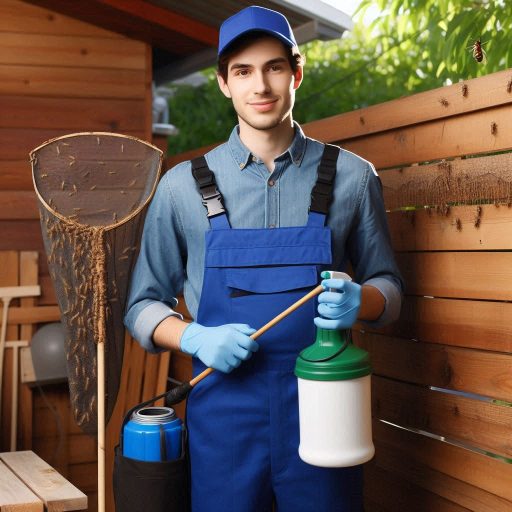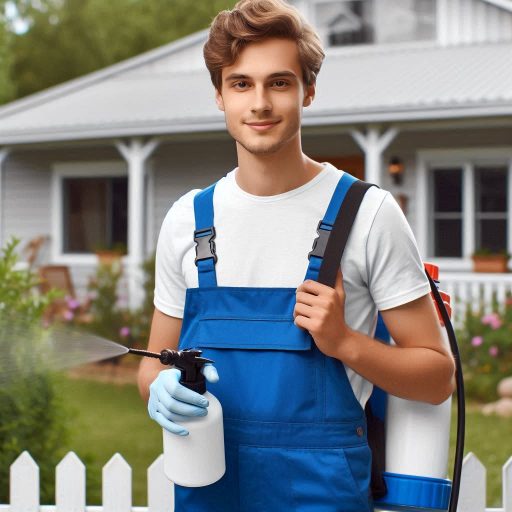Introduction
Work-life balance refers to the equilibrium between professional responsibilities and personal life.
It plays a vital role in maintaining overall well-being.
Achieving this balance allows individuals to manage their time effectively and reduce stress.
All professions can benefit from a healthy work-life balance, fostering job satisfaction and productivity.
Pest control professionals face unique challenges that can disrupt this balance.
Their work often requires long hours, including weekends and evenings.
The nature of pest control involves being on-call for emergencies, which can interfere with personal time.
Additionally, professionals frequently deal with seasonal fluctuations in demand, creating periods of intense work followed by lulls.
These factors make it challenging for pest control professionals to establish clear boundaries.
Long hours spent in the field can lead to burnout and fatigue.
Juggling client demands and personal responsibilities often results in added stress.
Moreover, the need for ongoing training and certification further complicates their schedules.
Understanding the importance of work-life balance is crucial for pest control professionals.
By implementing strategies to achieve this balance, they can enhance their overall quality of life.
Prioritizing personal well-being ultimately leads to improved job performance and satisfaction.
A focus on work-life balance can help pest control professionals thrive both in their careers and personal lives.
Understanding the Nature of the Pest Control Industry
The pest control industry presents unique challenges.
Professionals often work long hours and face demanding schedules.
They respond to emergencies and deal with unpredictable situations.
This can lead to an intense work environment.
Demanding Nature of the Job and Long Working Hours
Pest control technicians frequently work evenings and weekends.
Many clients need immediate help with infestations.
This urgency can disrupt personal plans and family time.
As a result, technicians may find it difficult to maintain a consistent routine.
Extended hours in the field can become the norm, leading to fatigue and exhaustion.
Physical and Mental Toll It Can Take on Individuals
The physical demands of the job are significant.
Technicians frequently lift heavy equipment and crawl into tight spaces.
They apply pesticides and other chemicals, often in harsh conditions.
This work can lead to fatigue and physical strain over time.
Injuries from lifting or slips can occur, further complicating their responsibilities.
Mental stress is another significant aspect of this profession.
Technicians must communicate effectively with clients while assessing problems.
They often handle high-pressure situations that require quick decision-making.
The responsibility of protecting homes and families weighs heavily on their shoulders.
This can lead to feelings of anxiety and overwhelm.
Moreover, the nature of pest control work can lead to isolation.
Technicians often work independently in the field.
This lack of social interaction can affect their mental well-being.
It is vital for professionals to seek connections and support from colleagues.
Networking and camaraderie can alleviate feelings of loneliness and enhance job satisfaction.
Importance of Finding Balance to Prevent Burnout
Burnout is a real risk for pest control professionals.
Long hours, physical demands, and mental stress contribute to this issue.
When individuals do not find balance, their performance suffers.
They may become less effective in their roles, leading to more stress.
This creates a vicious cycle that can be hard to break.
Finding a work-life balance is essential for success in pest control.
Professionals must prioritize their health and well-being.
Setting boundaries is crucial; technicians should designate specific work hours and stick to them.
Taking breaks throughout the day helps recharge physical and mental energy.
Scheduling time for family, hobbies, and relaxation is equally important.
Employers can support their staff in achieving balance as well.
Offering flexible schedules or encouraging time off can make a significant difference.
Providing resources for mental health support shows commitment to employee well-being.
In review, understanding the demanding nature of the pest control industry is vital.
Professionals must recognize the toll long hours and physical strain can take.
By prioritizing work-life balance, they can reduce burnout and improve overall job satisfaction.
Read: Best Pet Grooming Schools in the United States
Strategies for Setting Boundaries
Need to Establish Clear Boundaries Between Work and Personal Life
Establishing clear boundaries between work and personal life is crucial for pest control professionals.
These boundaries help maintain mental health and overall well-being.
In the pest control industry, technicians often face unpredictable schedules and urgent demands.
Without effective boundaries, work can easily spill over into personal time.
Therefore, setting clear limits is essential for a balanced life.
Tips on How to Limit Work-Related Stress Outside of Working Hours
First, define your working hours and stick to them.
Communicate these hours to your clients and colleagues.
By doing this, you signal when you are available and when you are not.
For example, if your work hours are from 8 AM to 5 PM, avoid responding to emails or calls after hours.
Setting this expectation helps reduce work-related stress outside of working hours.
Next, create a designated workspace at home.
This space should be separate from personal areas, minimizing distractions.
When you enter your workspace, focus solely on work tasks.
When you leave it, mentally switch gears to personal life.
This physical separation reinforces the boundaries between your professional and personal responsibilities.
Additionally, utilize technology to support your boundary-setting efforts.
Use apps that help manage notifications and restrict work-related communication.
For instance, set your phone to “Do Not Disturb” during family time.
This prevents work from intruding during your personal hours.
Establishing tech boundaries helps you disconnect and recharge.
Another effective technique is to prioritize your tasks.
Create a daily to-do list, identifying your most important tasks for the day.
Complete these tasks during work hours and leave non-urgent matters for later.
This strategy ensures that you focus on high-priority work without feeling overwhelmed.
Moreover, practice saying no when necessary.
Understand your limits and don’t overcommit.
If a client requests service outside of your set hours, explain your availability.
By doing so, you reinforce your boundaries while maintaining professionalism.
Clients appreciate honesty, and this fosters mutual respect.
Examples of Effective Boundary-Setting Techniques
Finally, make time for self-care activities.
Engage in hobbies or activities that bring you joy outside of work.
Whether it’s exercise, reading, or spending time with loved ones, prioritize these activities.
Scheduling personal time into your calendar helps ensure you maintain work-life balance.
In essence, setting boundaries is vital for pest control professionals.
Define your working hours and communicate them clearly.
Create a separate workspace to enhance focus.
Use technology to limit work-related communication outside of work.
Prioritize tasks and practice saying no when needed.
Make self-care a priority to recharge and rejuvenate.
By implementing these strategies, you can effectively manage your work-life balance and reduce stress.
Read: Finding the Right Work-Life Balance as a Nail Tech
Time Management Tips for Pest Control Professionals
Effective time management is crucial for pest control professionals.
Balancing multiple appointments, customer interactions, and administrative tasks can be overwhelming.
Here are time management strategies to help you prioritize tasks effectively.
Prioritize Tasks with a Daily Plan
Start each day by creating a daily plan.
List your tasks in order of importance.
Focus on urgent client needs and high-priority appointments first.
Use a simple to-do list or a task management app to track your daily tasks.
This approach helps you stay focused on what matters most.
As you complete tasks, check them off your list.
This gives you a sense of accomplishment and motivates you to keep going.
Set Realistic Goals and Deadlines
Setting realistic goals is essential for effective time management.
Identify what you can realistically achieve in a day.
Break larger tasks into smaller, manageable steps.
For example, instead of setting a goal to complete a detailed pest assessment, aim to finish the inspection phase in one day.
Set specific deadlines for each step.
This strategy keeps you accountable and prevents procrastination.
Regularly review your goals and adjust them as needed.
Remember, flexibility is key in pest control.
Unexpected situations may arise that require you to adapt your plans.
Utilize Tools and Techniques for Organization
Organization plays a vital role in time management.
Invest in tools that help you stay organized and on track.
Use scheduling software to manage appointments and follow-ups efficiently.
Digital calendars, such as Google Calendar, allow you to set reminders for upcoming jobs.
This helps you avoid double-booking and ensures you allocate enough time for each task.
Additionally, consider using mobile apps specifically designed for pest control professionals.
These tools often include features for job tracking, customer management, and invoicing.
By consolidating information in one place, you streamline your workflow and minimize the risk of overlooking important details.
Another effective technique is the Pomodoro Technique.
This method encourages you to work in focused bursts.
Set a timer for 25 minutes and concentrate on one task.
After the timer goes off, take a 5-minute break.
Repeat this process, and after four cycles, take a longer break.
This technique enhances concentration and helps you manage your energy levels throughout the day.
Note, mastering time management is essential for pest control professionals.
By prioritizing tasks, setting realistic goals, and utilizing effective tools, you can enhance your productivity.
Implement these strategies to achieve a better work-life balance and reduce stress.
Staying organized will allow you to provide excellent service to your clients while also enjoying personal time.
Read: Steps to Become a Professional Pet Groomer in the USA

Incorporating Self-Care Practices
Self-care is essential for maintaining a healthy work-life balance, especially for pest control professionals.
The demands of the job can lead to significant stress.
Therefore, prioritizing self-care helps alleviate this stress and enhances overall well-being.
Importance of Self-Care for Maintaining a Healthy Work-Life Balance
First, recognize the importance of self-care.
When pest control professionals neglect their mental and physical health, they risk burnout.
High-stress levels can lead to decreased job performance and strained relationships.
By incorporating self-care practices, individuals can better manage their stress and increase job satisfaction.
Self-Care Activities That Can Help Alleviate Stress
To start, engage in physical activities.
Exercise is a powerful stress reliever.
Regular workouts release endorphins, which boost mood and energy.
Consider activities like jogging, cycling, or joining a local gym.
Even simple stretches or yoga can help relieve tension after a long day.
Another effective self-care practice involves establishing a relaxing routine.
Create a designated time each day to unwind.
This might include reading a book, meditating, or enjoying a warm bath.
These calming activities help clear the mind and prepare for a restful night’s sleep.
Prioritizing relaxation improves focus and energy for the following day.
In addition, cultivate healthy eating habits.
A balanced diet plays a crucial role in mental and physical well-being.
Fueling your body with nutritious foods enhances mood and energy levels.
Try to incorporate more fruits, vegetables, whole grains, and lean proteins into your meals.
Staying hydrated is equally important, so drink plenty of water throughout the day.
Benefits of Prioritizing Mental and Physical Well-Being
Consider also the benefits of social connections.
Spending quality time with friends and family can significantly reduce stress levels.
Make an effort to engage in meaningful conversations and shared activities.
This social interaction fosters a sense of belonging and support, which is vital in high-pressure environments.
Additionally, set boundaries between work and personal life.
This separation helps prevent work from encroaching on personal time.
Establish specific work hours and stick to them.
Communicate these boundaries with colleagues and clients.
By doing so, you protect your time for self-care and personal interests.
Finally, don’t hesitate to seek professional help if needed.
Therapy and counseling can provide valuable coping strategies.
These resources help individuals manage stress and improve mental health.
Incorporating self-care practices is crucial for pest control professionals.
Prioritizing mental and physical well-being leads to reduced stress and enhanced job satisfaction.
By adopting self-care routines, individuals can achieve a more balanced and fulfilling life.
Read: Essential Skills Every Pet Groomer Should Have
Transform Your Career Today
Unlock a personalized career strategy that drives real results. Get tailored advice and a roadmap designed just for you.
Start NowFostering Support Systems
Achieving a healthy work-life balance is crucial for pest control professionals.
One significant way to promote this balance is by fostering strong support systems.
A supportive network can make a substantial difference in managing stress and achieving job satisfaction.
Importance of Having a Strong Support System in Place
Having a robust support system enhances emotional well-being.
It provides a safe space to share experiences and feelings.
Colleagues who understand the challenges of pest control can offer valuable insights.
They can also share coping strategies for difficult situations.
This connection fosters a sense of belonging and community.
Benefits of Seeking Support from Colleagues, Friends, and Family
Friends and family play a vital role in this support system.
They provide emotional encouragement and help maintain perspective.
When work becomes overwhelming, friends can remind you to take breaks and recharge.
Family members can assist with daily tasks, alleviating some pressures.
Their support allows pest control professionals to focus more on their jobs and less on home responsibilities.
Engaging with colleagues also offers professional advantages.
They can serve as mentors, guiding you through career challenges.
Their experience can provide insight into effective techniques for work-life balance.
Collaborative work can lead to shared solutions for common problems.
Discussing challenges openly can lead to collective problem-solving.
This practice enhances teamwork and morale within the workplace.
Resources for Finding Professional Guidance and Support
Seeking external professional guidance can further bolster support.
Organizations exist specifically to assist professionals in the pest control industry.
These organizations offer resources for stress management, career development, and personal growth.
Attending workshops and training sessions can provide new tools and strategies for maintaining balance.
You can find valuable networking opportunities through these organizations as well.
Online communities and forums are another excellent resource.
Engaging in discussions with peers across the country can provide fresh perspectives.
These platforms can also offer anonymity, allowing for candid discussions about challenges.
Sharing experiences with others in the field fosters a sense of unity.
This can be especially beneficial when dealing with job-related stressors.
In addition, consider reaching out to mental health professionals.
They can offer coping strategies tailored to your unique situation.
Many pest control professionals experience stress related to customer interactions and workload.
Mental health resources can provide coping techniques for managing this stress.
Fostering support systems is essential for pest control professionals.
Strong support networks enhance emotional well-being and promote work-life balance.
Colleagues, friends, and family contribute significantly to this network.
Utilizing professional guidance and resources can further support your journey.
Remember, you don’t have to navigate the challenges of the pest control industry alone.
Build your support system and thrive in both your personal and professional life.
Setting Boundaries with Clients
Establishing clear boundaries with clients is essential for pest control professionals.
It helps maintain a healthy work-life balance.
Effective communication about working hours sets the stage for professional relationships.
Clients often appreciate knowing when to expect responses.
Setting these boundaries can also reduce stress and prevent burnout.
Need for Clear Communication with Clients About Working Hours
Begin by clearly stating your working hours during the initial consultation.
This straightforward approach helps manage client expectations from the start.
Consider using a standard template for your communications that includes your hours.
This way, clients can easily reference it when needed.
Next, reinforce your boundaries during follow-up communications.
If a client reaches out outside your specified hours, respond politely.
Thank them for their inquiry, but remind them of your working hours.
For instance, you could say, “Thank you for your message. I am currently unavailable, but I will get back to you during my working hours.”
This reinforces your availability while maintaining professionalism.
Tips on How to Set Expectations with Clients Regarding Availability
It’s crucial to communicate your boundaries during busy periods.
Pest control can be unpredictable, especially during peak seasons.
If you anticipate a high volume of work, inform your clients in advance.
You might say, “Due to increased demand this season, my response times may be longer than usual.”
This helps set realistic expectations and reduces potential frustration.
Additionally, use automated responses for emails or messages outside your working hours.
Set an out-of-office message that includes your working hours and expected response time.
This practice reassures clients that their inquiries are important.
It also gives them clarity on when to expect a response.
Visual aids can enhance your communication.
Create a simple graphic or chart that illustrates your working hours.
Share this visual on your website and social media platforms.
When clients see this information, it reinforces your availability.
Examples of How to Effectively Communicate Boundaries with Clients
Incorporate boundary discussions into regular client check-ins.
Use these opportunities to reiterate your working hours and availability.
Emphasize that these boundaries benefit both parties.
You might say, “By sticking to these hours, I can ensure I provide the best service possible.”
This approach fosters mutual respect and understanding.
Finally, stay firm in enforcing your boundaries.
Some clients may test these limits, but consistency is key.
If a client continues to reach out outside of your hours, kindly remind them of your schedule.
This will reinforce the importance of your boundaries and ensure a professional relationship.
Setting boundaries with clients is vital for maintaining work-life balance.
Clear communication about your working hours helps establish mutual respect.
By following these tips, pest control professionals can effectively manage client expectations and enjoy a healthier balance between work and personal life.
Flexibility in Scheduling
Benefits of Flexible Scheduling for Pest Control Professionals
Flexibility in scheduling offers numerous benefits for pest control professionals.
It allows them to tailor their work hours to fit personal commitments.
This adaptability leads to a more satisfying work-life balance, crucial in today’s fast-paced world.
Pest control work often involves unpredictable hours due to varying client needs.
Flexible scheduling helps professionals manage these demands without sacrificing personal time.
One significant advantage of flexible scheduling is improved job satisfaction.
When professionals have control over their hours, they can prioritize their well-being.
They can choose to work during peak hours when they feel most productive.
Alternatively, they can opt for quieter times to manage their personal life.
This autonomy fosters a sense of empowerment and reduces stress.
Additionally, flexible scheduling can enhance client relationships.
Pest control professionals can accommodate client preferences, leading to better service.
Clients appreciate when technicians can meet their needs without rigid constraints.
This adaptability can also lead to increased referrals, as satisfied customers often share their positive experiences.
How Flexibility Can Help Professionals Achieve a Better Work-Life Balance
To achieve a better work-life balance, pest control professionals can incorporate flexible scheduling into their daily routines.
First, they should assess their peak productivity times.
Understanding when they perform best can help them create an effective schedule.
Next, professionals can communicate their availability with clients.
Setting clear boundaries allows clients to understand when they can expect service.
Another suggestion is to block off personal time in the schedule.
Professionals can allocate specific hours for family commitments or personal interests.
This practice ensures they dedicate time to non-work activities, which is vital for mental health.
Additionally, using digital tools can simplify scheduling.
Calendar apps can help manage appointments and personal commitments seamlessly.
Incorporating Flexible Scheduling Into Daily Routines
Pest control professionals should also consider implementing a rotating schedule.
This approach allows team members to share responsibilities while accommodating personal needs.
A rotating schedule fosters teamwork and supports colleagues in maintaining their work-life balance.
Furthermore, having designated off-days can help professionals recharge and return refreshed.
Finally, professionals can encourage open communication with their employers about scheduling needs.
Advocating for flexibility benefits individuals and creates a supportive workplace culture.
Employers who understand the importance of work-life balance can foster a happier, more productive team.
Flexible scheduling significantly enhances work-life balance for pest control professionals.
It offers benefits such as improved job satisfaction and better client relationships.
By incorporating flexibility into their routines, pest control professionals can achieve a more harmonious balance between their work and personal lives.
Embracing this approach boosts their well-being and contributes to their professional success.
Conclusion
Work-life balance is essential for pest control professionals.
It allows them to perform at their best while maintaining personal well-being.
A healthy balance reduces stress and prevents burnout.
When professionals prioritize self-care, they improve both their work and personal lives.
Taking time to recharge boosts motivation and productivity.
Setting clear boundaries between work and home is crucial.
Pest control professionals should define specific work hours and personal time.
Communicating these boundaries with clients and colleagues fosters respect for personal time.
It also ensures that professionals can focus on their personal lives without distractions.
To support work-life balance, pest control professionals can utilize various resources.
Online forums and support groups connect individuals facing similar challenges.
Professional organizations often provide workshops and seminars on self-care strategies.
Additionally, books and articles on time management can offer valuable insights.
Practicing mindfulness and relaxation techniques can help professionals decompress.
Regular physical activity and hobbies are also beneficial.
Remember, maintaining a healthy work-life balance is not just beneficial; it is vital for long-term success.
By prioritizing self-care and setting boundaries, pest control professionals can thrive both in their careers and personal lives.
Let’s commit to creating a sustainable work-life balance that leads to fulfillment and happiness.




